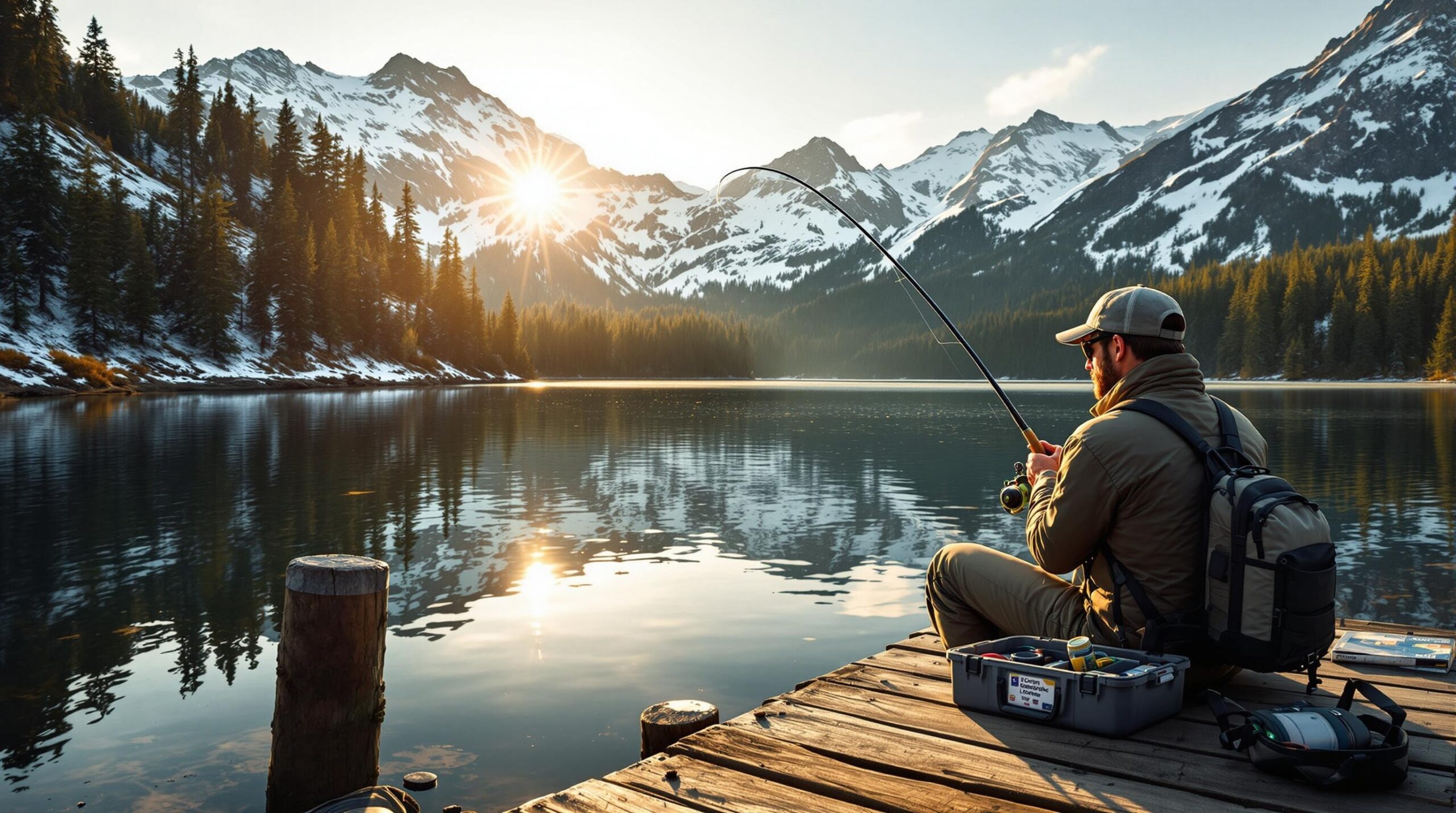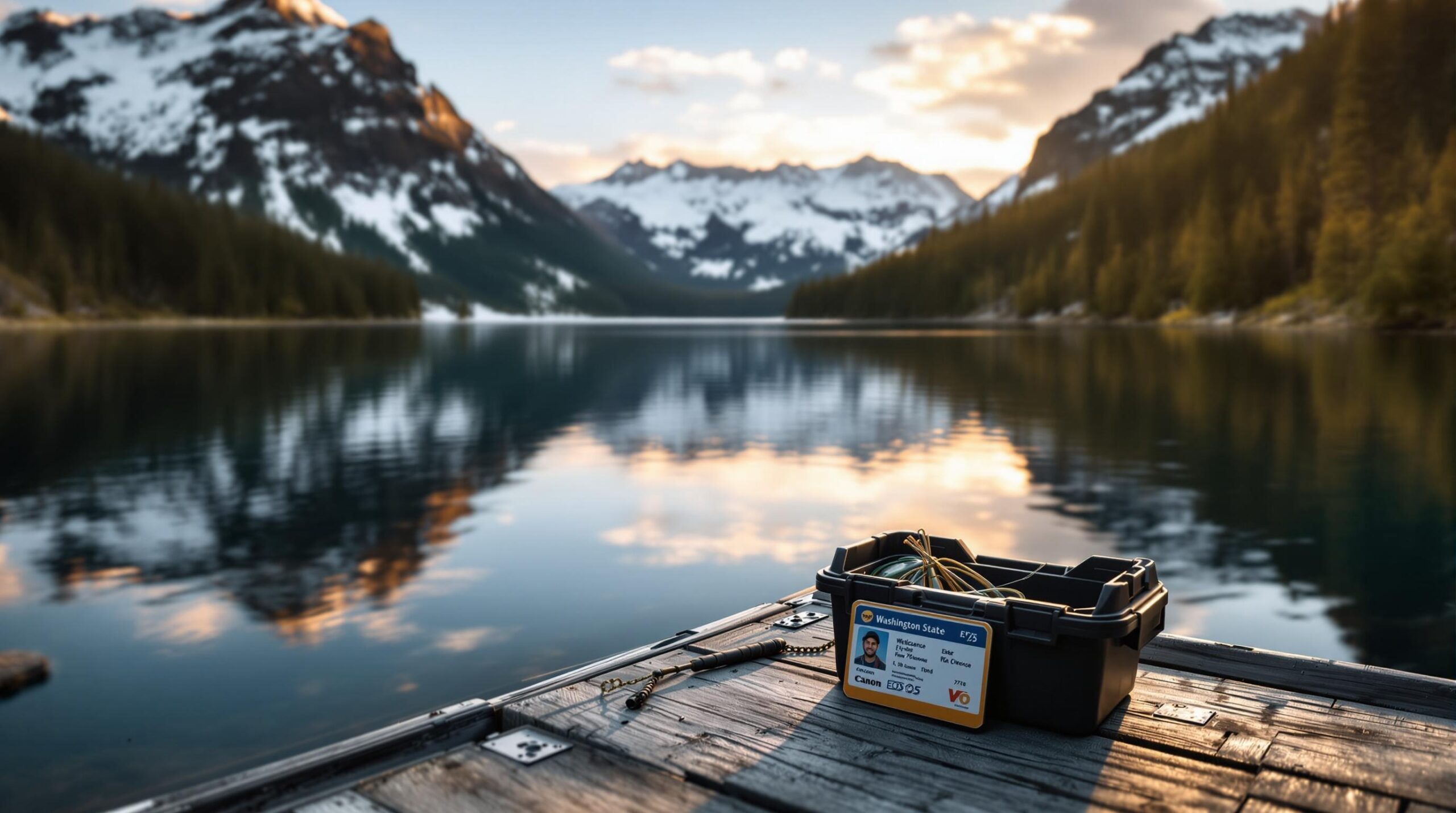According to the Washington Department of Fish and Wildlife, over 680,000 people purchase a Washington State Fishing License annually, making it one of the most popular outdoor activities in the Pacific Northwest. Whether you’re planning to cast your line in the pristine waters of Puget Sound or explore the countless rivers and lakes throughout the state, securing your Washington State Fishing License is the essential first step to enjoying Washington’s world-class fishing opportunities.
Key Takeaways
- A Washington State Fishing License is mandatory for anyone 15 years or older fishing in state waters
- Annual resident licenses cost $32.05 while non-resident licenses are $71.05
- Licenses can be purchased online, at sporting goods stores, or through WDFW offices
- Additional endorsements may be required for salmon, steelhead, and other specialized fishing
- Violations carry fines ranging from $124 to $573 depending on the infraction
https://www.youtube.com/watch?v=cnZ6Lmr0mYY
Washington State Fishing License Requirements and Regulations
Every angler aged 15 and older must carry a valid Washington State Fishing License when fishing in state waters. This requirement applies to all fishing methods, including fly fishing, bait fishing, and trolling.
The license requirement extends to both residents and non-residents. Military personnel stationed in Washington receive resident pricing regardless of their home state. Children under 15 can fish without a license when accompanied by a licensed adult.
Certain waters require additional endorsements beyond the basic Washington State Fishing License. Salmon fishing demands a salmon endorsement, while steelhead fishing requires its own specific endorsement. These additional permits help maintain sustainable fish populations through regulated harvest limits.
Washington State Fishing License Types and Costs
The state offers several license options to accommodate different fishing preferences and schedules. Understanding these options helps you choose the most cost-effective license for your fishing plans.
Annual Washington State Fishing License Options
The standard annual license provides the best value for regular anglers. Resident annual licenses cost $32.05, while non-resident licenses are priced at $71.05. These licenses remain valid through March 31 of the following year, regardless of purchase date.
Senior citizens aged 70 and older receive significant discounts. Resident seniors pay just $5 for their annual license, while disabled veterans with 30% or higher disability ratings fish for free with proper documentation.
Short-Term License Alternatives
Visitors and occasional anglers can choose from several short-term options. One-day licenses cost $11.05 for residents and $16.05 for non-residents. Five-day consecutive licenses run $23.05 for residents and $34.05 for non-residents.
These temporary licenses work perfectly for fishing vacations or trying the sport before committing to an annual license. The five-day option often provides better value than purchasing multiple single-day licenses.
Where to Purchase Your Washington State Fishing License
Modern technology has made acquiring your Washington State Fishing License more convenient than ever. Multiple purchase channels accommodate different preferences and situations.
The official WDFW website offers 24/7 license purchasing with immediate access to temporary licenses. You’ll receive your license instantly via email, allowing you to fish the same day you purchase.
Physical retailers throughout Washington sell licenses during business hours. Sporting goods stores, bait shops, and many grocery stores serve as authorized dealers. Popular chains like Dick’s Sporting Goods, Big 5 Sporting Goods, and local tackle shops maintain current licensing systems.
WDFW regional offices provide in-person service for complex licensing situations. Staff can answer specific questions about endorsements and help with unique circumstances like military status verification.
Essential Washington State Fishing License Endorsements
Basic fishing licenses cover most freshwater fishing, but Washington’s diverse fisheries often require additional endorsements. Understanding these requirements prevents violations and keeps you fishing legally.
Salmon Endorsement Requirements
Salmon fishing requires a separate $24.15 endorsement for residents and $41.15 for non-residents. This endorsement covers all salmon species in both saltwater and freshwater environments. The additional cost reflects the specialized management needed for salmon conservation.
Popular salmon fishing destinations like the Columbia River and Puget Sound fall under this endorsement requirement. Without it, you’re limited to other fish species even in salmon-rich waters.
Steelhead Endorsement Details
Steelhead fishing demands its own endorsement costing $24.15 for residents and $41.15 for non-residents. These anadromous rainbow trout require careful management due to their complex life cycles and conservation challenges.
The steelhead endorsement applies to both wild and hatchery fish, though regulations differ significantly between the two. Wild steelhead often require immediate release, while hatchery fish may be retained within specific limits.
Understanding Washington State Fishing License Legal Framework
The Washington State Fishing License system operates under comprehensive legal authority granted to the Washington Department of Fish and Wildlife. This authority stems from state law requiring sustainable fish population management while providing recreational opportunities for residents and visitors.
Legal compliance extends beyond simply carrying a license. Anglers must understand catch limits, size restrictions, and seasonal closures that vary by water body and species. These regulations change annually based on fish population assessments and habitat conditions.
The Revised Code of Washington (RCW) Title 77 establishes the legal foundation for fishing regulations. Violations can result in criminal charges, equipment seizure, and loss of fishing privileges.
Enforcement and Penalty Structure
Fish and Wildlife officers patrol Washington waters with full law enforcement authority. They conduct routine checks of licenses and catch compliance, particularly during peak fishing seasons and in popular locations.
Penalty structures reflect the seriousness of various violations. Fishing without a Washington State Fishing License carries a $124 fine for first offenses. Repeated violations or serious infractions like exceeding catch limits can result in fines up to $573 and potential criminal charges.
Equipment seizure represents another significant consequence. Officers can confiscate fishing gear, vehicles, and boats used in violations.
Advanced Washington State Fishing License Considerations
Experienced anglers often overlook subtle licensing requirements that can create legal complications. Understanding these details helps avoid unexpected violations and maximizes your fishing opportunities throughout the state.
Multi-State Fishing Scenarios
Washington shares water bodies with Oregon, Idaho, and Canada, creating complex licensing situations. The Columbia River requires understanding which state’s waters you’re fishing and maintaining appropriate licenses for each jurisdiction.
Some waters fall under joint management agreements between states. The Columbia River below Bonneville Dam operates under shared regulations, but anglers still need licenses from the state where they launch their boat or cast from shore.
International fishing presents additional complications. Fishing in Canadian waters from Washington requires Canadian licenses regardless of how briefly you cross the border. GPS devices help track your location in these sensitive areas.
Specialized Fishing Activities
Certain fishing methods and target species create licensing requirements beyond standard endorsements. Ice fishing, night fishing, and tournament participation each carry specific considerations under Washington State Fishing License regulations.
Guided fishing trips require verification that your guide maintains proper licensing and that their client coverage extends to you. Some guides include temporary licenses in their fees, while others require clients to purchase their own Washington State Fishing License.
Digital License Management and Technology
Modern licensing systems have changed how anglers manage their Washington State Fishing License requirements. Digital platforms provide real-time access to regulations, harvest reporting, and license verification.
The WDFW mobile app allows license storage on smartphones, eliminating concerns about forgotten physical licenses. Digital licenses carry the same legal authority as printed versions and provide backup access through cloud storage.
Electronic harvest reporting through the app helps biologists track fish populations and fishing pressure. This data directly influences future regulations and license requirements, making your participation valuable for conservation efforts.
License Renewal and Automatic Systems
Automatic renewal services prevent lapses in your Washington State Fishing License status. These systems charge your payment method annually and send renewal notifications well before expiration dates.
However, automatic renewal doesn’t account for regulation changes or new endorsement requirements. Annual review of your license needs keeps you properly authorized for your intended fishing activities.
Conservation Impact of Washington State Fishing License Fees
License fees directly fund fish habitat restoration, hatchery operations, and research programs throughout Washington. Understanding this connection helps anglers appreciate the value their Washington State Fishing License provides beyond legal compliance.
The state allocates license revenues through the Fish and Wildlife Fund, which supports habitat improvement projects, fish stocking programs, and enforcement activities. These investments directly improve fishing opportunities for license holders.
Hatchery programs depend heavily on license revenue to maintain salmon and steelhead populations in developed watersheds. Without this funding, many popular fishing destinations would lose their productive fisheries to habitat loss and development pressure.
Economic Impact Analysis
Recreational fishing generates over $2.4 billion annually in Washington’s economy, according to the American Sportfishing Association. This economic activity supports thousands of jobs in rural communities that depend on fishing tourism.
License sales data helps state economists track recreational fishing trends and predict future economic impacts. This information influences infrastructure investments and tourism marketing strategies that benefit fishing communities statewide.
Planning Your Washington Fishing Adventures
Successful fishing trips require more than a valid Washington State Fishing License. Understanding seasonal patterns, water conditions, and species availability helps maximize your investment in licensing and travel time.
Washington’s diverse geography creates distinct fishing seasons that vary dramatically by region. Coastal areas offer year-round opportunities, while mountain lakes remain frozen for several months. Planning your license purchase timing can optimize value for seasonal fishing patterns.
Popular destinations like the Olympic Peninsula and Cascade Mountains require advance planning for peak seasons. Learning basic techniques before your trip helps you take advantage of optimal fishing conditions when they occur.
Species-Specific Planning Considerations
Different fish species require varying levels of preparation and licensing complexity. Salmon fishing demands the most preparation due to complex regulations, seasonal closures, and weather dependence.
Trout fishing offers more consistent opportunities throughout the fishing season, making it ideal for beginners learning to handle Washington State Fishing License requirements. Many alpine lakes remain productive from spring through fall with relatively simple regulations.
Steelhead fishing presents the greatest challenge for novice anglers due to specialized techniques and strict conservation measures. These fish require significant skill development and understanding of habitat preferences.
Safety and Responsible Fishing Practices
Your Washington State Fishing License represents more than legal authorization—it signifies your commitment to responsible fishing practices and conservation ethics. Understanding these responsibilities protects both natural resources and fellow anglers.
Catch and release practices extend fish populations beyond what regulations alone can achieve. Proper handling techniques minimize stress and mortality in released fish, particularly important for sensitive species like steelhead and wild salmon.
Leave No Trace principles apply strongly to fishing activities. Proper disposal of fishing line, tackle, and trash protects wildlife and maintains the natural beauty that makes Washington fishing destinations special.
Weather and Water Safety
Washington’s variable weather conditions create significant safety challenges for anglers. Hypothermia risk exists year-round due to cold water temperatures, even during summer months.
Personal flotation devices are required by law in most boating situations and recommended for all fishing from watercraft. Many fishing-related fatalities involve experienced anglers who underestimated risk conditions.
Communication devices become essential for remote fishing locations common throughout Washington. Cell phone coverage remains spotty in many prime fishing areas, making satellite communicators valuable safety investments.
Frequently Asked Questions
How much does a Washington State Fishing License cost?
Resident annual licenses cost $32.05, while non-resident annual licenses are $71.05. Seniors 70+ pay just $5 for resident licenses. One-day licenses range from $11.05 (resident) to $16.05 (non-resident).
Where can I buy a Washington State Fishing License?
Purchase online at fishhunt.dfw.wa.gov, at sporting goods stores like Dick’s or Big 5, local bait shops, many grocery stores, or WDFW regional offices. Online purchases provide immediate digital access.
Do I need additional endorsements for salmon or steelhead fishing?
Yes, salmon fishing requires a $24.15 (resident) or $41.15 (non-resident) salmon endorsement. Steelhead fishing needs a separate endorsement at the same cost. Both are required beyond your basic license.
What age requires a Washington State Fishing License?
Anyone 15 years or older must have a valid fishing license. Children under 15 can fish without a license when accompanied by a licensed adult. Military personnel receive resident pricing regardless of home state.
What are the penalties for fishing without a license in Washington?
First-time violations carry a $124 fine. Repeat offenses or serious infractions can result in fines up to $573, equipment seizure, and potential criminal charges. Officers can confiscate gear and vehicles.
Can I use my Washington fishing license in other states?
No, Washington licenses are only valid in Washington waters. Columbia River and shared waters require understanding which state’s jurisdiction you’re fishing in and maintaining appropriate licenses for each state.
Ready to start your Washington fishing adventure? Visit the official WDFW website to purchase your license today and begin exploring the incredible fishing opportunities Washington has to offer.
Sources:
Washington Department of Fish and Wildlife – Annual License Sales Report (2023)
Washington Department of Fish and Wildlife – Conservation Program Funding Analysis (2022)
Washington Department of Fish and Wildlife – Digital Services Annual Report (2023)
American Sportfishing Association – Economic Impact Report Washington State (2022)
Federal Aid in Sport Fish Restoration Program – Annual Performance Reports Washington State (2023)
Washington State Recreation and Conservation Office – Outdoor Recreation Economic Impact Study (2022)


